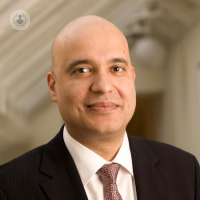Can teaching damage your voice? Vocal cord nodules explained…
Written in association with:Vocal cord nodules are an injury that gives you a rough quality to your voice. They’re popularly associated with singers, but this injury can also affect anyone who has to speak a lot as part of their job. In this article, expert ENT surgeon Professor Guri Sandhu explains how vocal cord nodules develop, when to see a doctor, and what treatment is available.

What are vocal cord nodules?
Vocal nodules are swellings on the vocal cords. They always appear in pairs – you have a right vocal cord with a swelling and a left vocal cord with a swelling. We tend to see them in professions of heavy voice use such as presenters, teachers, and telephonists.
We also occasionally see them in singers where they’re performing excessively and perhaps in a suboptimal technique or in a vocal register that isn’t their natural vocal register.
How do vocal cord nodules develop?
Vocal cord nodules are essentially an injury, involving a poor closure technique – rather than the vocal cords closing on a broad front, they’re tending to make first contact in the middle. This becomes a pressure point, so if you’re using your voice excessively, you’re not giving the voice enough rest. If you’re a performer, you’re not doing warm-up.
You tend to get a swelling almost like a blister. If you had those repaired with voice rest, then that blister will resolve. But if you carry on over time, they get bigger and they can ultimately end up calloused and permanent – so they’ll be resistant to treatment with speech therapy.
How do they affect the voice?
Vocal nodules can give you a rough quality to your voice. If you use your voice over a prolonged period, it can also give you vocal fatigue and give you aches in the neck because you’ve actually have to try harder to bring the vocal cords together because of the gap that now exists before and after the nodule. They also affect the vibration of your voice.
There are some people who wouldn’t actually notice that they have vocal nodules. For some singing stars like rock performers, it adds character to their singing voice so they may not want anything done about them. But certainly if someone has a purer voice, or is a teacher and has to talk for many hours, this rough quality can get worse – and they can suffer vocal fatigue.
How do I know if I have vocal cord nodules?
There are other things that will also give you a rough quality to your voice. If you’ve had cold or flu, you may have laryngitis and you may have a rough voice that subsequently gets better.
Other conditions which affect the vocal cords specifically include:
- a cyst
- swelling from acid reflux
- a benign growth on your vocal cords
Finally, if you’re a smoker and you have been smoking for quite a while, you could have a small tumour or growth on your vocal cords.
Generally, if:
- your voice has been poor,
- it has been rough for more than three or four weeks, and
- this isn’t something that you tend to suffer on a regular basis,
we generally advise that you have your vocal cords looked at and assessed.
What is the best treatment for vocal cord nodules?
In most cases, if you had a period of rest and your vocal nodules have been there a short time, they will disappear. Obviously, you cannot do this with everyone, so management, in most cases, in the first instance, has to be speech therapy.
A speech therapist will take the patient through good vocal habits, hydration, warm-ups, and also tell them about having a quiet time where they have vocal breaks. The vast majority of vocal nodules will resolve by management in the hands of a speech therapist.
What about surgery?
It is very rare – and it should be very rare – that vocal nodules go on to have surgery. Luckily, surgery for vocal cord nodules is straightforward, and is usually a day case procedure. The patient under general anaesthesia will have an instrument pass through the mouth that visualizes the vocal cords, and under the microscope, they can be removed.
One of the downsides of having surgery on the vocal cords is that there is a prolonged recovery period. The patient will have to have complete voice rest for a number of days and then minimal voice usage for another two weeks or so. Then they will see speech therapist to gradually build them up to normal activity.
Can vocal cord nodules return after surgery?
As mentioned above, vocal cord nodules are an injury. Therefore, if the patient's excessive use or poor technique persists then they have the potential for recurring.


